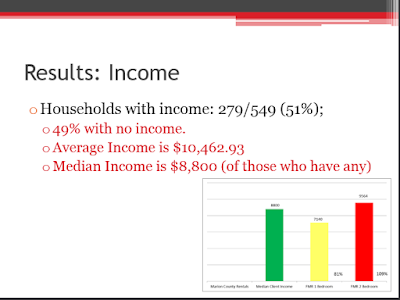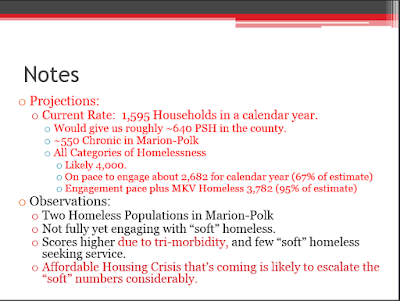Revised: December 2018
By Sarah Owens and Michael Livingston
Salem and Marion County are talking about putting up $40,000 each toward hiring someone to oversee implementation of the Mid Willamette Homeless Initiative Task Force's
Strategic Plan.
Characterizing the Plan as "a tremendous platform for our communities to build on", Salem Mayor Chuck Bennett said the City Manager was already working on several items in the plan. "We're very excited about it", he said.
Mayor Bennett opened the final meeting of the Mid Willamette Homeless Initiative Task Force promptly at 4pm with 10 Task Force members in attendance, enough for a quorum, and about 17 in the audience. Also present was former Councilor Bednarz, who took a seat on the dais, seconded every motion, and voted, even though he's no longer a member, having been replaced by Councilor Andersen. Absent were the Polk County reps, along with Verena Wessel and Kim Freeman of Keizer, and Gladys Blum of Salem. Chief Moore and Sheriff Myers arrived late.
During the public comment period that began about 4:10, Charles Fong talked about ADUs. TJ Putman of Salem Interfaith Hospitality Network, who also runs the City's tenant-based rental assistance (TBRA) program, asked the Task Force to recommend funding TBRA programs for families. Tina Hansen, who's attended most Task Force meetings, expressed her approval of the Task Force's work.
Next up was Jon Reeves to talk about the results of his committee's community engagement efforts. Reeves mused about the process they'd used, read some survey comments, and received murmurs of appreciation for his hard work.
At 5:35 precisely, Commissioner Carlson began introducing the two recommendations, which had not adopted at the last meeting because they needed to be reworked, and one new recommendation to offer training on service/assistance animals to landlords and "other agencies." See
here. The Task Force adopted those and voted to delete the landlord-assessment-tool recommendation made by the Health and Housing Committee, as they'd decided it wasn't useful. Commissioner Carlson then moved adoption of the Strategic Plan, which motion passed.
At that point, Karen Ray was called on to help the Task Force "pivot to implementation", a process she and the Task Force had been working on since the November 2016 meeting.
Ray began by telling the Task Force that they'd put together a "high quality plan" that would require "changes in organizational policies and procedures." She asked them whether they voted for it because it's a quality plan, or just to "go along." Bruce Bailey copped to going along. Carlson said it put "meat on the bones" of the 10-Year Plan just as she talked about doing last year, thanks to the high-quality work of the committees. Councilor Andersen said something about its needing a project manager. Ray changed the subject.
 |
| Ray's "map" of Marion-Polk Homeless Services |
She said the Task Force had "dissect[ed] what's currently going on in the community" and found that services for the homeless were not well coordinated. (Illustration at left.) She went on to talk about the need for systems change generally, eventually arriving at issue facing the Task Force, which was that, so far, no one on the Task Force or in the community had volunteered to be the "backbone organization" that would oversee or staff the Plan's implementation.
According to Ray, this was likely because they'd "not yet seen what their self-interest is in solving the persistent problems of homelessness."
Or, as the
Statesman Journal put it, maybe it's because, "[m]ore than a year [after the Task Force began its work], it's hard to see what's been accomplished", despite more than 1,300 hours spent in meetings and the completion of a 20-page strategic plan. (By our calculations, Task Force members, staff and technical advisors spent a total of 538 hours in Task Force meetings. Members of the provider community, media and general public spent another 642. That's a total of 1,008 hours in Task Force meetings, to which may be added another 330 hours in committee meetings, for a total of 1,338 hours in meetings, at a value of at least $31,523 (
$23.56/hr volunteer rate for 2015) -- first and last month's rent and security deposit for 9 homeless families.)
Prior to its last meeting, the Task Force had had very little discussion about plan implementation. They'd had the one meeting with Karen Ray where nothing was decided, a five-minute discussion at the end of the December meeting and a few minutes at the very end of the the January meeting, which they spent listening to Commissioner Carlson talk about about
her Implementation Structure Concept memo (p 41).
Some Task Force members were visibly taken aback to hear, half an hour before the meeting and the Task Force were to end, Mayor Clark propose putting a staff person in the
MWV Council of Governments (COG) to "make sure the strategic plan happens."
COG has no history or experience with homeless housing and services. As Mayor Clark put it,
When we [Carlson and Clark] talked to the [COG Board of Directors'] executive committee, they were really not all that interested in being the ones that understand homelessness, so that's where this group of leaders [sic] would be an advisory group to the COG Board. So we would construct an implementation team that would have leadership from the participating organizations, and then a middle management team, and then there would be networking amongst the line staff. So that all has to be developed.
Although it was not entirely clear, Carlson and Clark appeared to be proposing that someone (probably Carlson and Clark) choose a leadership team and hire a staff person who, under the direction and control of COG, as advised by the leadership team, would convene a 3-layer implementation team that would be responsible for "making sure the strategic plan happens." If everything worked out, implementation would begin June 1, 2017, and the COG would adjust dues payments to pick up the cost of the staff person.
About 6:15, with everyone wanting to go home, and no one really understanding what they were voting on, the Task Force approved the proposal. Then, Mayor Clark announced that the COG had given the Task Force some kind of award, reminiscent of the one
Mayor Peterson received last year, and Commissioner Carlson handed out framed certificates of appreciation to all the Task Force members, and crystalline trinkets to each of the staff.
Sorry homeless people, maybe we'll have something for you next winter.



























